Hydrogen peroxide or H2O2 is a chemical compound with 2 hydrogen atoms and 2 oxygen atoms, giving it the chemical formula H2O2. It’s commonly used as a disinfectant and antiseptic because it kills bacteria, viruses, and fungi. It offers numerous plant benefits and can help keep them healthy and thriving. It can improve soil quality, prevent disease and pests, and even promote root growth when used correctly. Let’s check out more information on Hydrogen Peroxide for plants below.
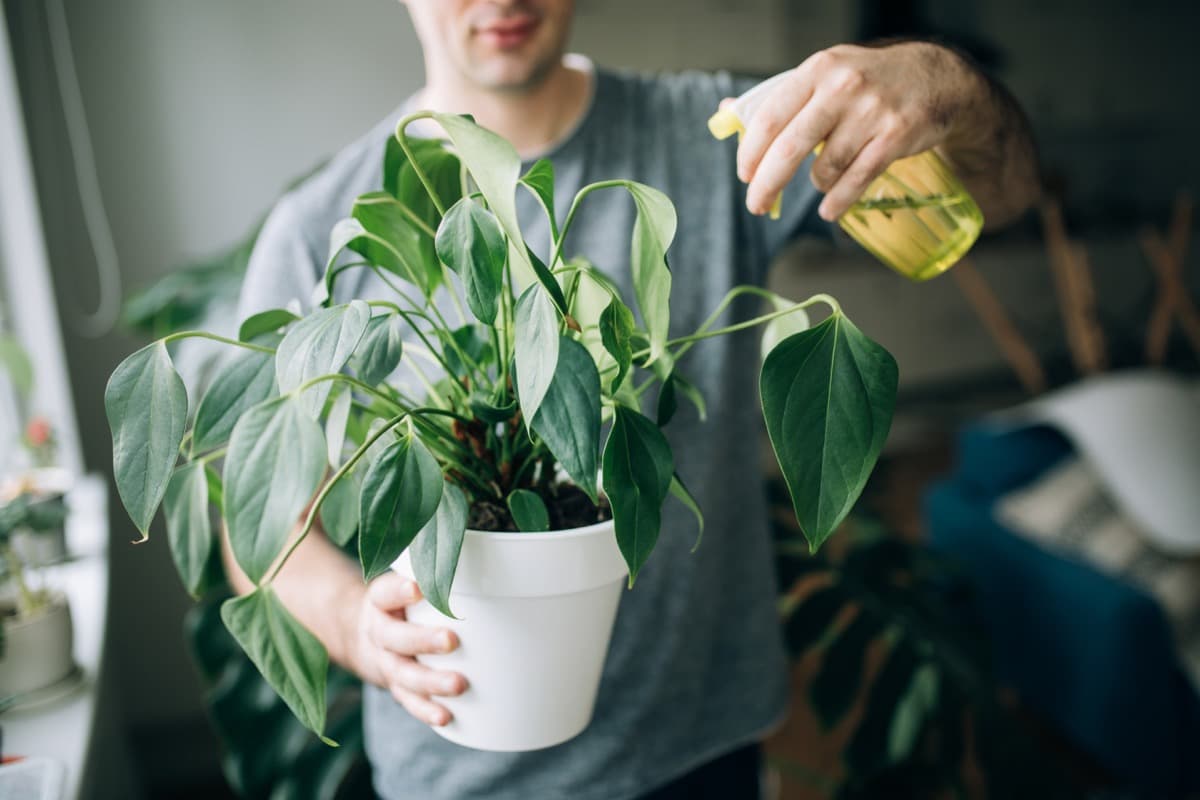
Benefits Of Hydrogen Peroxide for Plant Health
- It is an excellent tool for gardeners looking to improve their plants’ health and growth. One major benefit of hydrogen peroxide is its ability to promote root growth by adding oxygen to the soil. When used as a soil drench, hydrogen peroxide will help prevent root rot, which can harm plant health.
- Another significant advantage of using hydrogen peroxide in gardening is its effectiveness in controlling fungal diseases such as powdery mildew and pythium root rot. Simply spraying the affected areas with water and hydrogen peroxide can help prevent the further spread of these pesky diseases.
- In addition to its household uses, hydrogen peroxide can be incredibly beneficial for plants. When added to soil or water, it releases oxygen into the environment, which helps aerate the roots and promote healthy growth.
- Another benefit of using hydrogen peroxide for plants is its ability to help control fungal infections. When mixed with water and sprayed on leaves, it can kill harmful bacteria and fungi without damaging the plant.
- Hydrogen peroxide can be an effective pest control agent by eliminating harmful bacteria, viruses, fungus, and other pathogens that may harm your plants’ growth. This makes it a natural alternative to chemical pesticides that can harm humans and animals.
- In addition, hydrogen peroxide also serves as a natural pesticide by killing harmful bacteria that can harm your plants’ growth and development. It’s much safer than traditional chemical pesticides, often leaving harmful residues on fruits and vegetables.
- Moreover, using hydrogen peroxide for plants can also help increase plant yield by providing essential nutrients such as magnesium and sulfur while helping in root development. Hydrogen Peroxide also helps stimulate seed germination by breaking down the tough outer shell around seeds, making it easier for them to sprout quickly.
- It can be applied as a natural pesticide against common pests such as spider mites and aphids. A diluted solution sprayed onto affected leaves will kill these pests without harming beneficial insects like bees and ladybugs.
- Using hydrogen peroxide in your garden can improve soil quality over time. Its antibacterial properties prevent harmful bacteria from thriving in the soil while promoting healthy microbial activity essential for plant growth.
In case you missed it: Greenhouse Growing for Urban Areas: Unlocking the Potential of Urban Spaces
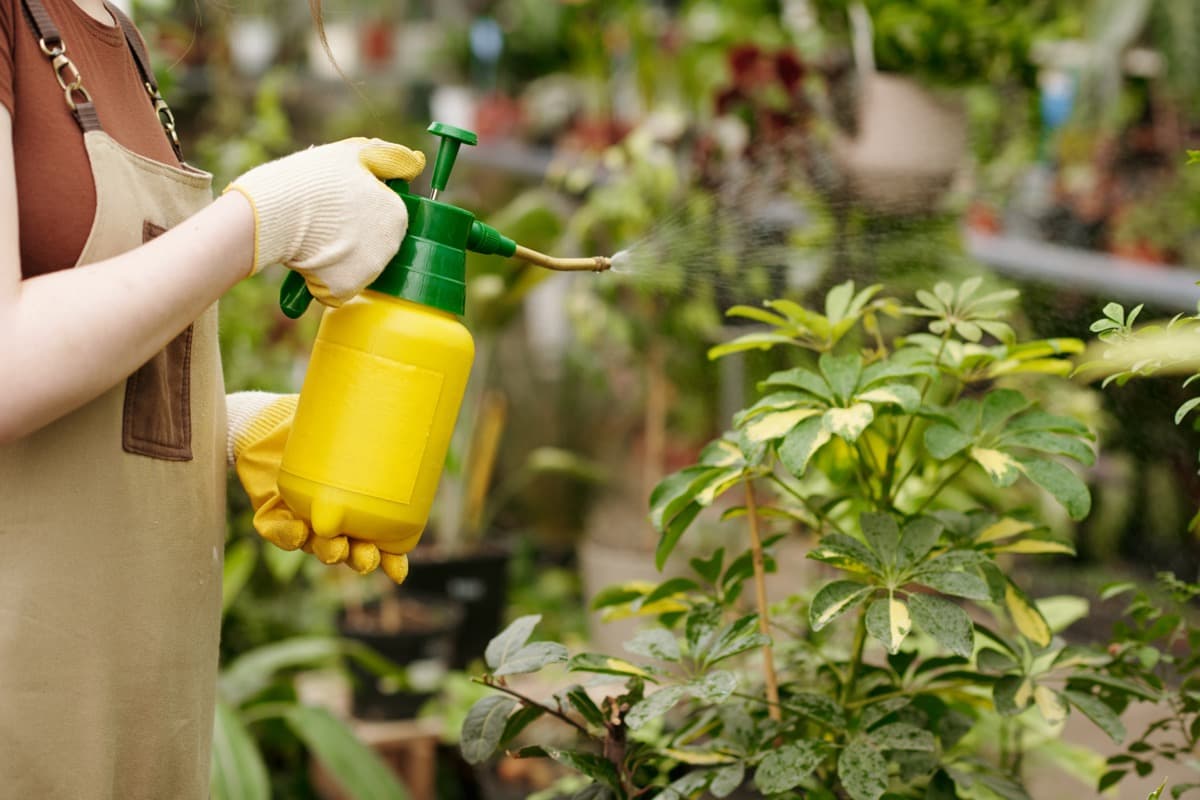
Hydrogen Peroxide Plant Treatment
Hydrogen peroxide is a versatile substance used for various purposes, including plant treatment. It contains oxygen which helps to stimulate root growth and provide essential nutrients to the plants. Using hydrogen peroxide as a plant treatment can help promote healthier growth and increase overall plant health. Using hydrogen peroxide as a plant treatment has been several benefits ranging from increased nutrient uptake capacity, better disease resistance, and faster seedling emergence times – all leading towards improved crop yields.
Hydrogen Peroxide for Plant Roots
- It can be effective in promoting healthy roots in plants. When used properly, it can help to oxygenate the soil and fend off harmful pathogens that could damage or kill your plants.
- To use hydrogen peroxide for plant roots, you will want to dilute H202 with water first. Mix about 1 part hydrogen peroxide with 3 parts water before applying it to your garden plants. This is safe for most types of plants when used in moderation.
- When applied directly to the soil around your plant’s roots, hydrogen peroxide can help to aerate the soil and increase nutrient uptake. This is especially beneficial if compacted or clay soils tend to drain poorly.
- In addition, hydrogen peroxide has been shown to help protect against root rot caused by excess moisture or fungal growth. Adding oxygen into the mix creates a more hostile environment for these types of pathogens while also providing much-needed nutrients for your plants.
- Using hydrogen peroxide on your plant’s roots can be a simple yet effective method to promote healthy growth and prevent common issues like root rot.
Hydrogen Peroxide Foliar Spray
- It is a plant treatment that involves spraying a diluted solution of hydrogen peroxide directly onto the leaves of plants. This method can promote healthy growth, increase resilience against diseases and pests, and even improve the appearance of your plants.
- The advantages of using hydrogen peroxide as a foliar spray include its ability to supply oxygen to the plant cells, which can help them produce energy more efficiently. Additionally, it can break down harmful chemicals or toxins that can accumulate on the plant leaves surface over time.
- To create a hydrogen peroxide foliar spray, mix about 1 part hydrogen peroxide with 10 parts water in a clean spray bottle. It’s important not to use too strong a concentration as this could damage your plants.
- When applying the solution to your plant’s leaves, cover both sides thoroughly but avoid getting into their eyes or onto flowers or fruit. Repeat this process once every two weeks throughout the growing season for optimal results. Using hydrogen peroxide as a foliar spray is an easy way to boost your plant’s health without relying on harsh chemicals or expensive treatments.
In case you missed it: How to Grow and Care for Periwinkle Flowers: A Step-by-Step Guide
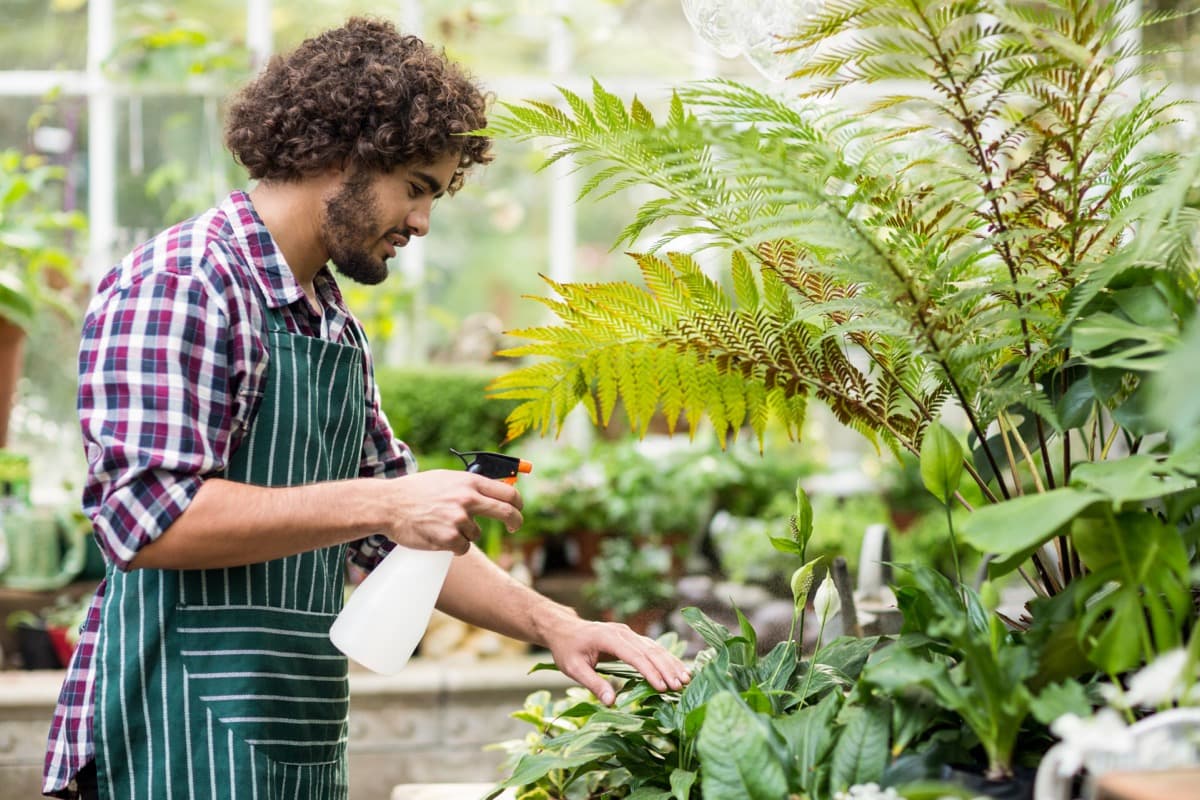
Hydrogen Peroxide for Plant Pest Control
- It’s useful for controlling common garden pests like spider mites and aphids. Hydrogen peroxide works by suffocating the pests and destroying their eggs.
- To use hydrogen peroxide as a pest control agent, mix one part 3% hydrogen peroxide with 3 parts water in a spray bottle. Spray the mixture directly onto affected plants and thoroughly coat both sides of the leaves.
- It’s important to note that while hydrogen peroxide is generally safe for plants, it can have negative effects if used too frequently or in high concentrations. Always dilute it before use, and avoid spraying on young or delicate plants.
- Using hydrogen peroxide on your plants can promote overall plant health by providing extra oxygen to roots and improving nutrient uptake.
Using Hydrogen Peroxide as Plant Fertilizer
- Hydrogen peroxide can be a powerful plant fertilizer when used correctly. Unlike traditional fertilizers that often contain harsh chemicals, hydrogen peroxide is a natural and safe alternative that won’t harm your plants or the environment.
- When using hydrogen peroxide as a plant fertilizer, it is important to dilute H2O2 with water first. Mixing a tablespoon of 3% H2O2 in 1000 ml water is a good ratio. This will ensure the solution isn’t too strong and won’t damage your plants’ delicate root systems.
- Once you’ve diluted the hydrogen peroxide, you can use it to water your plants just like you would with any other fertilizer. The extra oxygen molecules in the solution will help stimulate root growth and give your plants an added boost of nutrients.
- One thing to remember when using hydrogen peroxide as a plant fertilizer is that it should be used sparingly. While it can effectively promote healthy growth, too much can damage your plants.
- Using hydrogen peroxide as a plant fertilizer can be an easy way to promote healthy growth without relying on harmful chemicals. Remember to dilute it properly and use it in moderation for best results.
Hydrogen Peroxide for Seed Germination
- By using hydrogen peroxide, you can increase the chances of successful seed germination. One way to use hydrogen peroxide for seed germination is to soak your plant seeds in water and hydrogen peroxide. This will help disinfect the seeds and prevent any fungal or bacterial infections from hindering their sprouting.
- Another method is misting your soil with diluted hydrogen peroxide before planting your seeds. This helps provide oxygenation and added moisture essential for healthy growth.
- It’s important not to overdo it when applying hydrogen peroxide, as too much could damage or even kill the delicate seeds before they can grow.
In case you missed it: How to Grow and Care for Prickly Pear: A Comprehensive Guide for Beginners
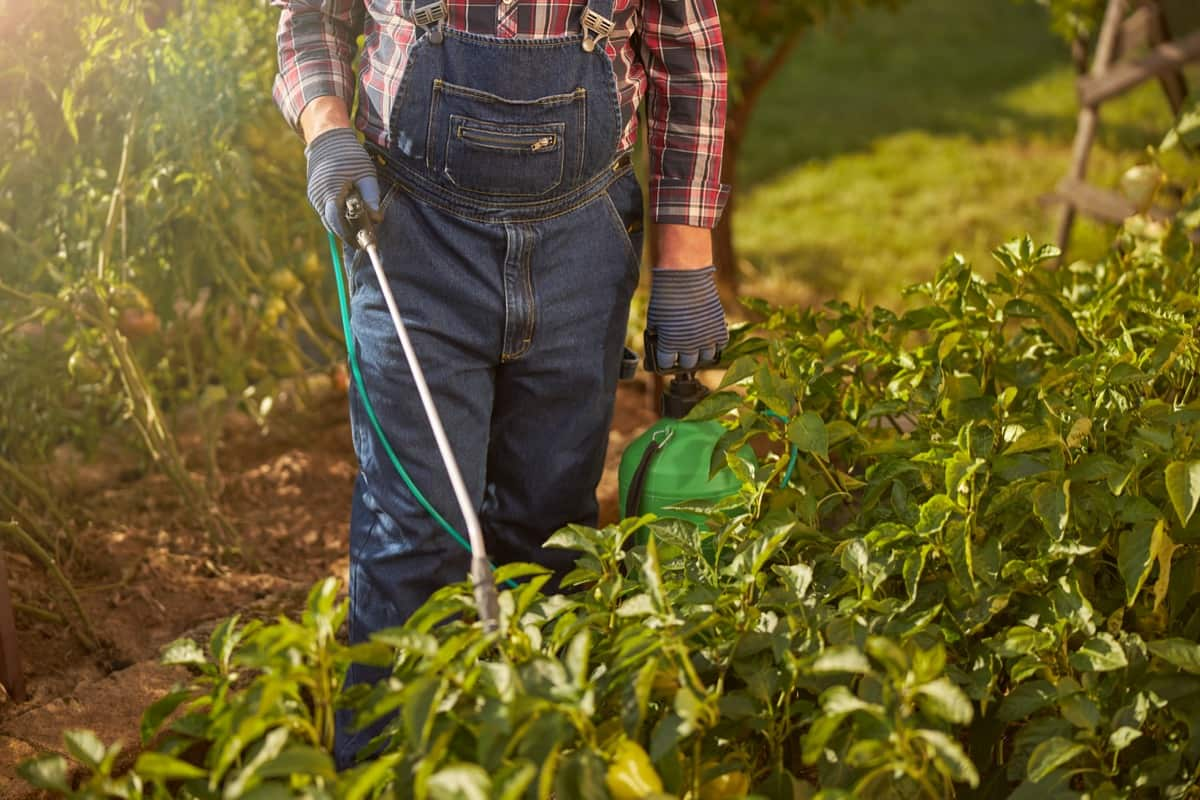
Hydrogen Peroxide for Plant Disease Control
- Hydrogen peroxide is an effective solution for plant disease control and prevention. It destroys harmful bacteria, viruses, and fungi that can cause plant diseases. It is a great alternative to chemical pesticides that can harm the environment and beneficial organisms.
- It’s important to dilute it properly before applying it to your plants. Mix about 1 part hydrogen peroxide with 3 parts water in a spray bottle or watering can. Make sure to apply the solution evenly on all areas of your plants.
- One of the benefits of using hydrogen peroxide for plant disease control is its ability to boost plant immunity. Regularly treating your plants with this solution can help them develop stronger defenses against common diseases like powdery mildew and root rot.
Hydrogen Peroxide as a Soil Oxygenator
- Hydrogen peroxide can be used as a soil oxygenator, which helps increase the amount of oxygen available to plant roots.
- Plants can’t absorb nutrients effectively if there is not sufficient oxygen in the soil, leading to poor growth and even death. Using hydrogen peroxide as a soil oxygenator can help prevent this problem by increasing plant oxygen availability.
- Mix 1 teaspoon of 3% hydrogen peroxide with 1 cup of water and pour it directly onto your houseplants or outdoor garden to use hydrogen peroxide as a soil oxygenator. Be sure not to overwater your plants after using this method. It’s important to note that while hydrogen peroxide can benefit plant health when used properly, using too much or too often can harm your plants. Always follow recommended dosages and application methods carefully.
- Using hydrogen peroxide as a soil oxygenator can effectively promote healthy plant root growth.
In case you missed it: Top 11 Beautiful Color Changing Flowers
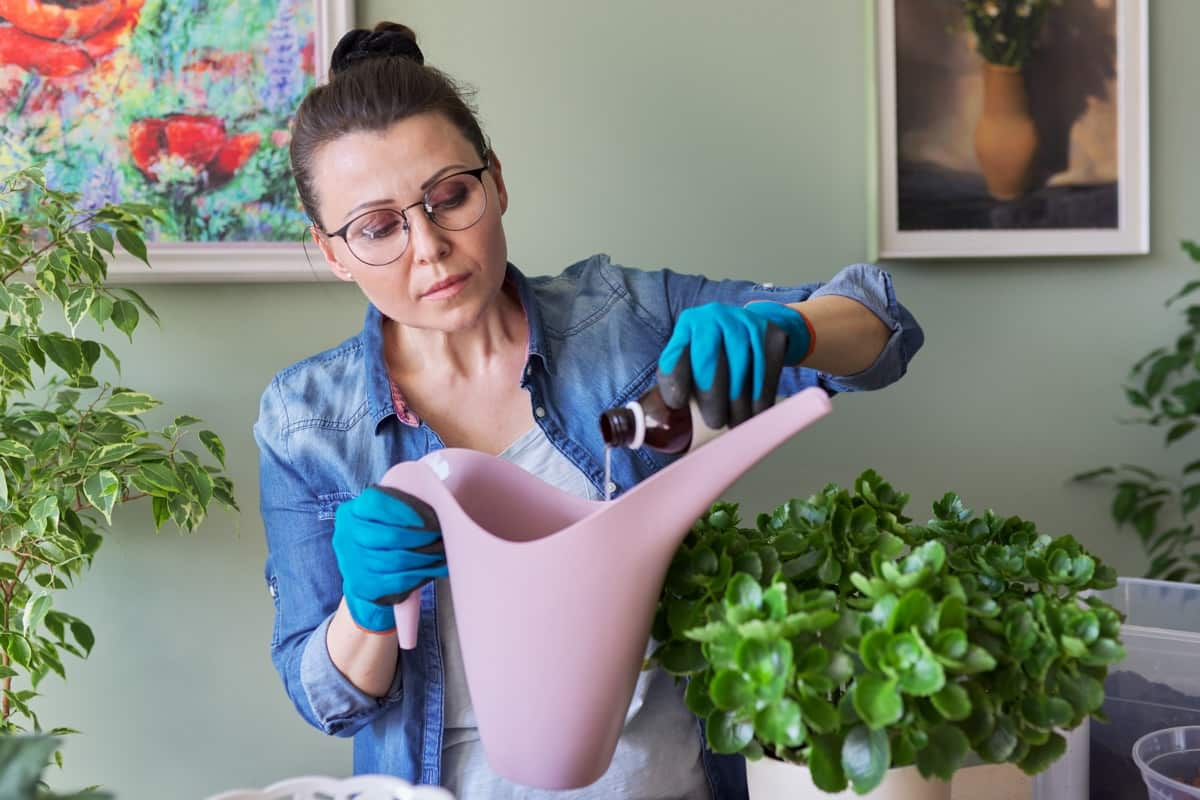
Hydrogen Peroxide for Hydroponic Systems
- Hydroponic systems are becoming increasingly popular among gardeners as an innovative way to grow plants. Using hydrogen peroxide in these systems can provide various benefits, such as maintaining a healthy root system and preventing harmful bacteria growth.
- When using hydrogen peroxide for hydroponics, it is essential first to dilute it according to the instructions on the label. It is recommended to use a 3% concentration of hydrogen peroxide and mix one part with four parts of water.
- Adding this solution to your hydroponic system can help prevent algae buildup on your plants’ surface or roots. This helps ensure enough oxygen in the water for plant growth.
- Hydrogen peroxide can boost nutrient uptake by breaking down organic matter into usable plant elements when applied correctly. As a result, you will see healthier and more robust plants growing within your hydroponic setup.
Some Precautions When Using Hydrogen Peroxide
- Following some precautions, like wearing protective tools like goggles and gloves, before applying hydrogen peroxide in the garden.
- It’s also important to dilute the solution properly before use. Using undiluted hydrogen peroxide can harm your plants’ roots or leaves. Carefully follow the instructions before application on the product label for safe dilution ratios.
- Avoid using hydrogen peroxide too frequently as it may cause excess oxidation of plant tissues leading to damage. Also, ensure not to mix different types of chemicals with hydrogen peroxide without proper knowledge about their reaction.
- Additionally, avoid spraying during hot weather or under intense sunlight, as this could burn foliage due to its oxidizing properties. Please water your plants first before applying any treatment so that they will have a good drink before any application occurs.
- Dispose of any unused portion safely by following local regulations since Hydrogen Peroxide breaks down into water and oxygen over time but could still be harmful in large quantities when misused or disposed of improperly.
- When applying hydrogen peroxide to your plants, please don’t over-apply it, as too much of a good thing can harm your garden. Stick to recommended doses and application methods depending on the problem you’re trying to solve.
- Store any leftover hydrogen peroxide in a cool dark place away from sunlight, as heat and light can cause it to break down into water and oxygen faster than intended.
In case you missed it: Expert Tips to Grow the Tastiest Tomatoes: DIY Guide

Conclusion
Hydrogen peroxide is an easy-to-use solution with many benefits for your garden. It is important to remember that H202 should always be handled carefully. Always follow the recommended dilution ratios and application methods to avoid damaging your plants or harming yourself.
- How to Grow Tomatoes Organically at Home: A Comprehensive Guide
- Organic Gardening on a Budget: Low-Cost Methods and Materials
- Gongura Seed Germination and Planting Methods
- Cabbage Seed Germination and Selection
- Broccoli Seed Germination and Selection
- Asparagus Seed Germination and Variety Selection
- Seasonal Flower Gardening: Best Practices for Spring, Summer, Fall, and Winter
- How to Grow Hibiscus from Flower
- Plantation Ideas for Home Decoration: A Beginners Guide
- Flower Garden Designs and Layouts for Beginners
- Planting and Spacing Techniques in Papaya: A Beginner’s Guide
- Growing Gold: Essential Techniques for Planting Pineapples
- How to Make Kalanchoe Plant Bushy: Home Remedies and Solutions
- 11 Reasons Why Your Gardenia is Not Blooming: Home Remedies and Solutions
- Eco Elegance: The Guide to Designing a Drought-Tolerant Landscape
- Gardening on a Slope: Strategies for Hillside Landscaping
- Nourish and Flourish: Top Organic Mulches for Thriving House Plants
- Everything You Want to Know about Indian Mogra Flower: Discover Uses and Growing
- Green Thumb Success: Expert Tips for Cultivating Greenhouse Pumpkins All Year Round
- Maximize Growth & Flavor: The Ultimate Guide to Companion Planting in Herb Gardens
- How to Control Rhododendron Problems Naturally: Home Remedies and Organic Ways to Fix Them
- Natural Magic: The Remarkable Benefits of Cinnamon for Plants
- Best Steps to Revive Dying Tulip with Natural and Organic Treatment
- 10 Reasons Why Your Angel Trumpet is Not Blooming: Remedies and Treatment
- How to Fix Periwinkle Leaf and Flower-Related Problems: Natural Remedies and Solutions
- How to Fix Zinnias Leaf and Flower Problems: Discover Natural and Home Remedies
- Organic Steps to Induce Lemon Tree Flowers: A Comprehensive Guide
- Bloom Booster: Crafting the Perfect Homemade Bougainvillea Fertilizer
- Optimizing Growth: A Guide to Applying NPK Fertilizer for Potted Plants
- 10 Best Homemade Fertilizers for Rubber Plant: DIY Recipes and Application Method
- How to Boost Female Pumpkin Flowers: Effective Steps for More Flowers and High Yields
- Transform Your Indoor Garden: Top Benefits of Pink Salt for Houseplants
- 10 Best Homemade Fertilizers for Peacock Plants (Calathea): Easy DIY Guide
- Unlock Blooms: 9 Reasons Why Your Potted Chrysanthemum is Not Blooming
- 8 Reasons Why Your Potted Hibiscus is Not Blooming: Fix it with Simple Solutions
- Unlock Blooms: 9 Key Reasons Your Potted Frangipani Won’t Flower